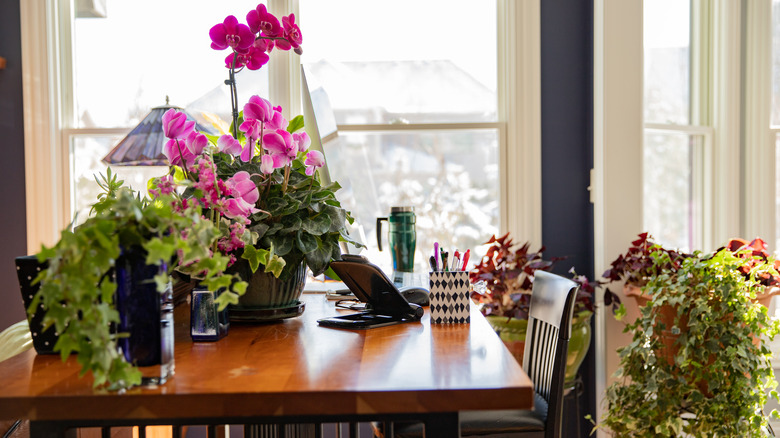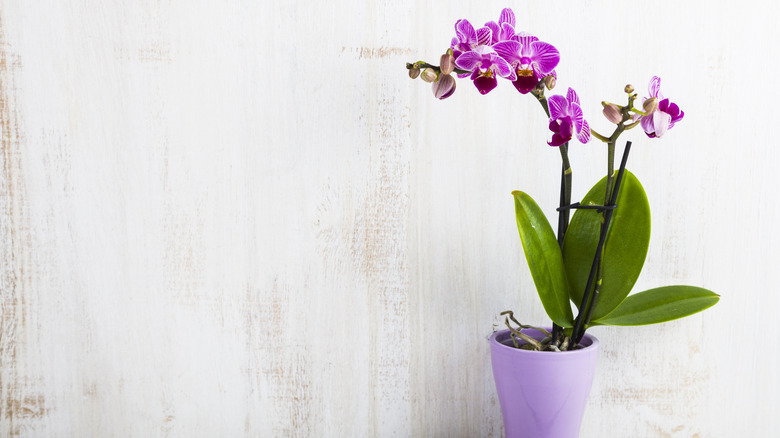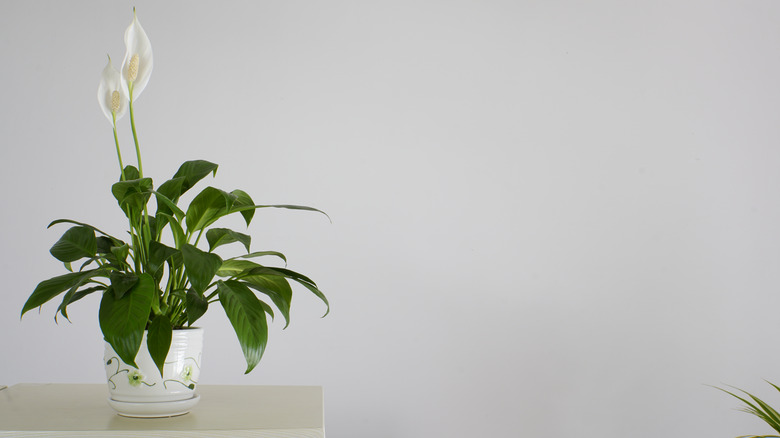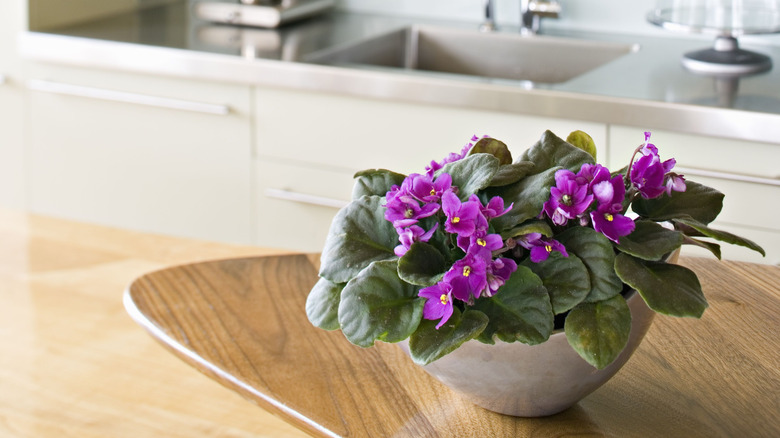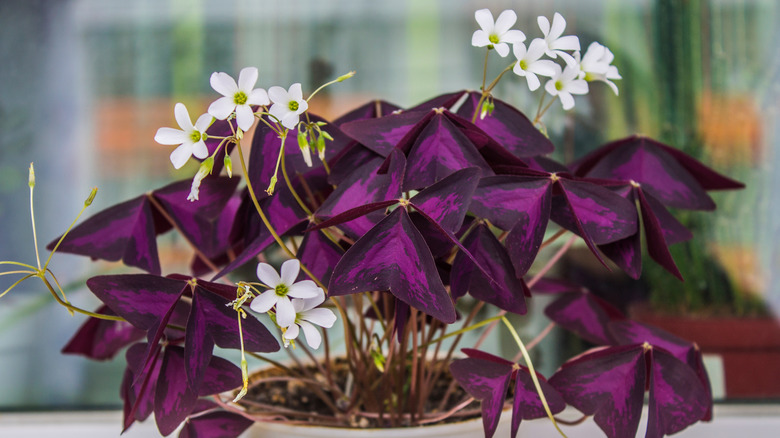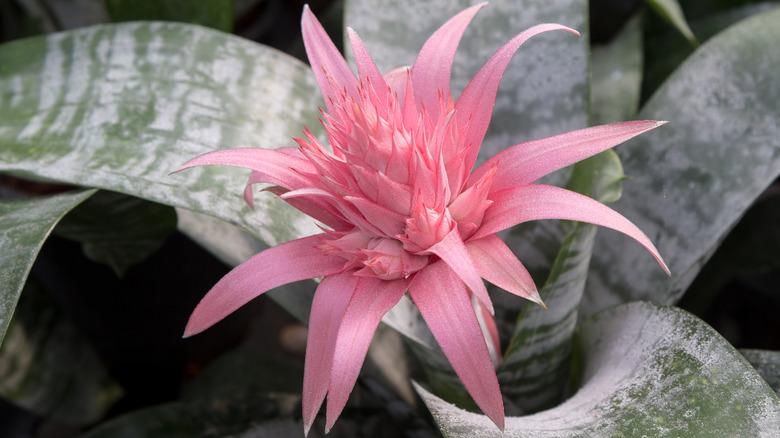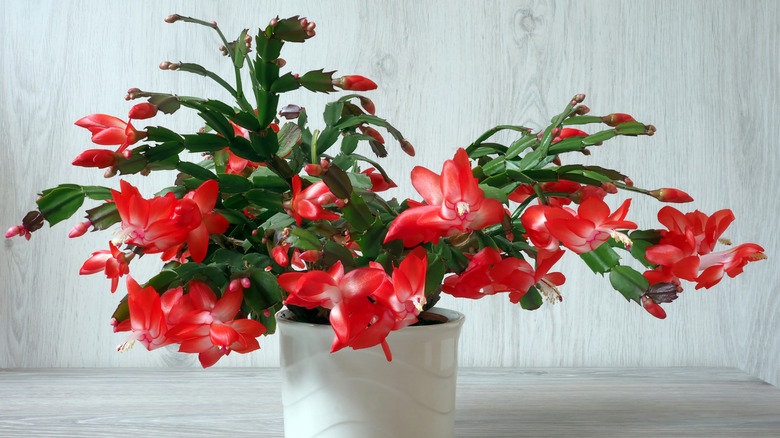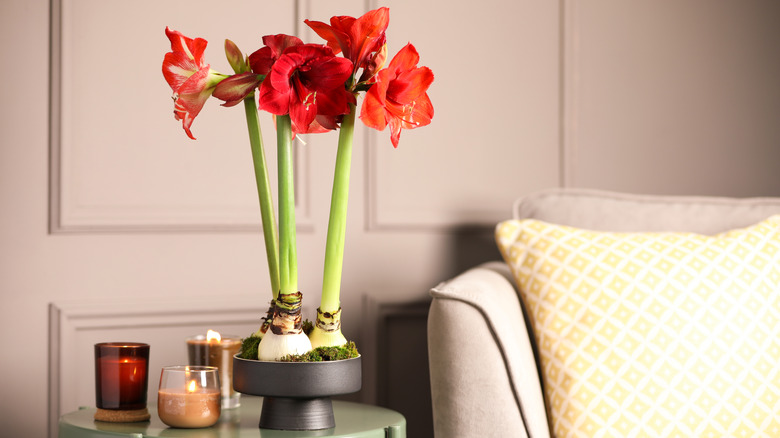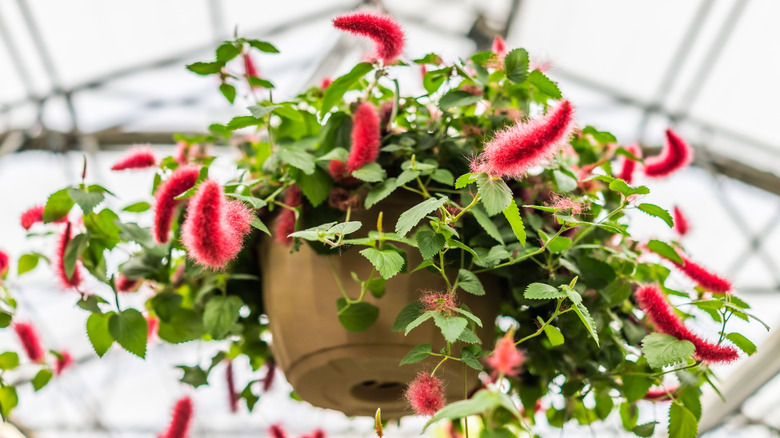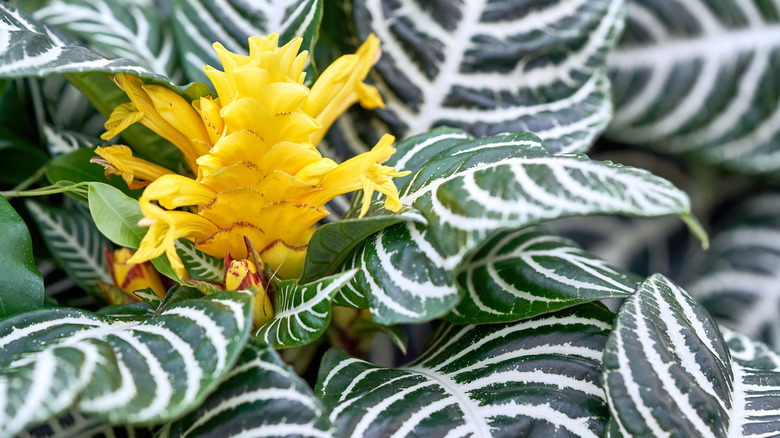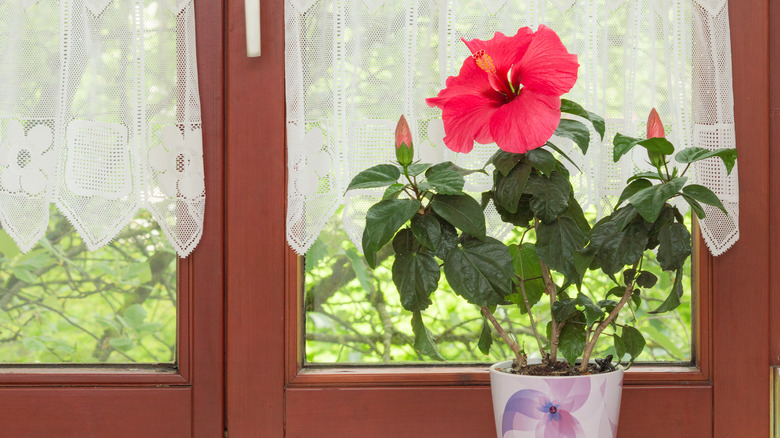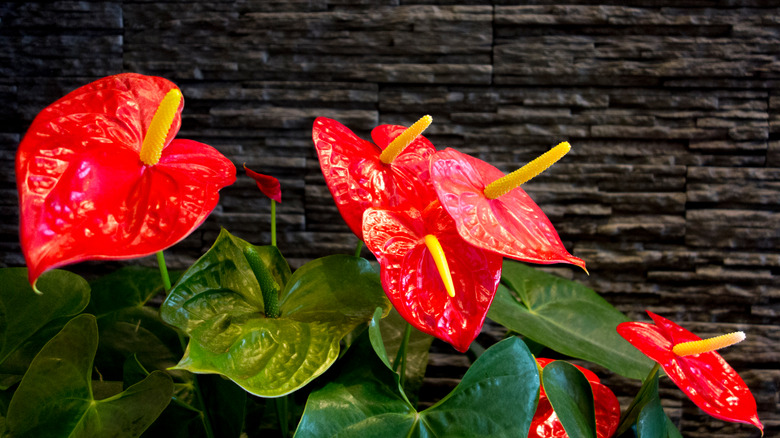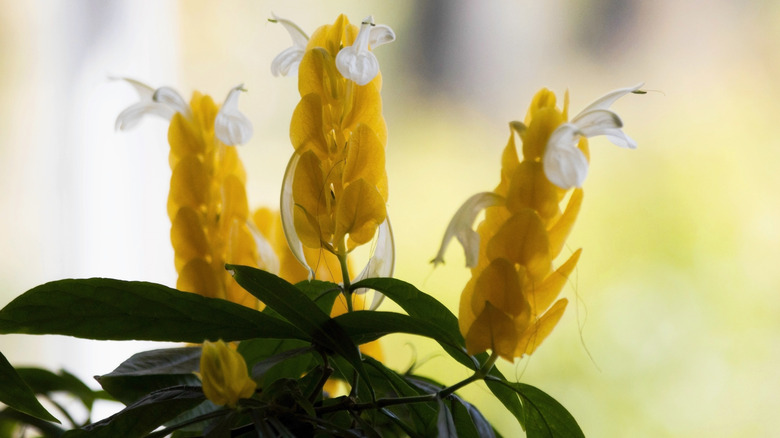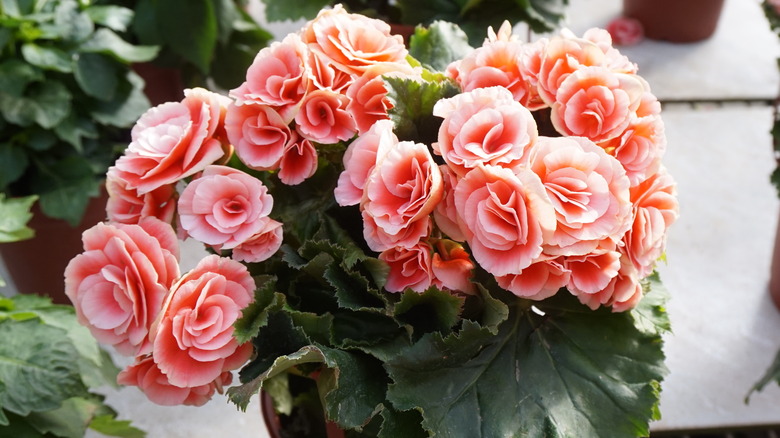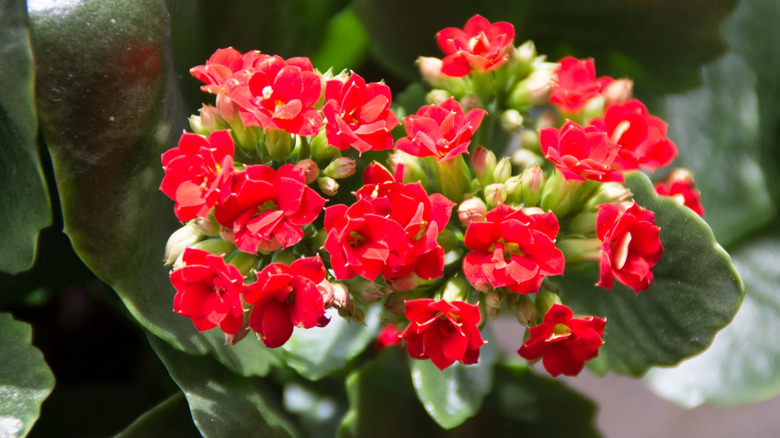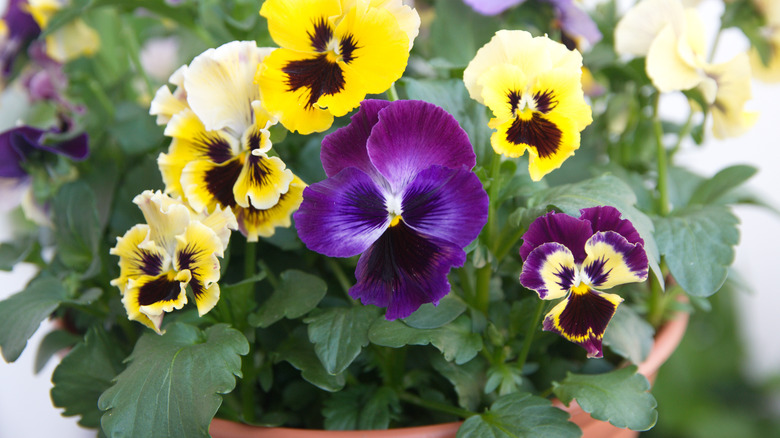15 Flowering Houseplants That Will Make Your Home Look Amazing
When it comes to giving your home a burst of natural beauty, nothing comes close to houseplants. Additionally, plants are good to have in your home for a variety of reasons. Besides looking good, research shows that they might help reduce stress levels and make you feel soothed and comfortable. Studies also show that houseplants improve creativity and productivity. Plus, caring for them is therapeutic, and evidence also suggests that keeping plants indoors may improve the quality of the air inside, according to Healthline.
Plants that bloom have all of the benefits listed above, plus they add even more color to your home. And while most blossoming plants are easy to care for, if you find keeping houseplants alive challenging, there are some that require little attention and can even survive a skipped watering. To that end, we have searched the internet and found 15 flowering houseplants that will make your home look and feel amazing.
1. Orchid
When it comes to beauty, nothing quite compares to orchids (Orchidaceae). They are unique, with long, arching branches and colorful blooms. To give orchids the best care, The Spruce recommends attempting to duplicate their natural environment as much as possible, which means keeping them in a specialized potting mix that includes bark, cork, and moss to help prevent them from developing root rot.
Sunlight Needs: strong light, but avoid direct afternoon light
Water Needs: water generously every week or month depending on season, allowing roots to dry out between waterings
2. Peace lily
Peace lilies (Spathiphyllum) add a touch of elegance to your home. They can grow to be fairly large, so it's best to keep them in a spacious part of the house. If you want a gorgeous flowering plant, but struggle to keep some plants alive, then the peace lily is for you because they are also easy to care for. However, these plants can cause slight stomach upset if ingested, so keep them away from children and pets, per The Old Famers Almanac.
Sunlight Needs: plenty of indirect light, avoiding afternoon sunlight
Water Needs: keep the soil moist, but do not overwater
3. African violet
If you're looking for a small plant that will add a burst of purple to almost any room, then you might want to consider an African violet (Saintpaulia ionantha). Gardening Know How notes that getting the watering system down on African violets is important, adding that you should water with lukewarm water that has sat for 48 hours. Water at the base to avoid getting any foliage wet. Pinch the dead blooms to encourage more flowering.
Sunlight Needs: filtered light with average intensity
Water Needs: when the soil is almost dry to the touch
4. Oxalis
The Oxalis (Oxalidaceae) is an eye-catching plant also known as a false shamrock because its triangular-shaped leaves look like the leaves you see on shamrock plants. While the leaves on Oxalis plants are eye-catching, they have small, white blooms that add to their appeal. They are also relatively easy to care for as long you meet their light and water needs, according to Better Homes & Gardens.
Sunlight Needs: plenty of bright to indirect sunlight
Water Needs: allow soil to dry out halfway down between waterings
5. Aechmea bromeliad
If you're looking for something exotic that will take your breath away, then an aechmea bromeliad (Bromeliaceae) might be right up your alley. These plants produce wide, dusty leaves and spectacular, spiked blooms. Aechmea bromeliads require attention, however — you must keep them in a space that receives good circulation and does not get too warm, advises the Gardening Channel.
Sunlight Needs: indirect sunlight
Water Needs: water the center of the bloom about halfway every two weeks; when the soil is dry to the touch, water it generously until it drains from the bottoms of the pot
6. Christmas cactus
Don't let the name fool you: The Christmas cactus (Schlumbergera buckleyi) will bloom all year long in the right conditions. These plants have thick, hanging branches with red, pink, purple, or white blooms attached to the ends. To stimulate blooming, place the plant in a completely dark area for about 12 hours at night and expose it to about 10 hours of light during the day a couple of weeks before Christmas, according to Martha Stewart.
Sunlight Needs: bright, indirect sunlight
Water Needs: water when the top of the soil is dry or when the leaves begin to wrinkle
7. Amaryllis
Another plant you may see around the holidays is the Amaryllis. With large beautiful blooms, these plants are stunning. To keep these plants all year, remove dead flowers when the stalk turns yellow, leaving part of the green stem. Place in a dark area for eight to 10 weeks, and check periodically for new growth. When you see the stem is growing again, fertilize to encourage blooming for another season, suggests the University of Minnesota.
Sunlight Needs: six hours of full sun daily
Water Needs: water when top 2 inches of soil feels dry
8. Chenille plant
If you have room for a hanging plant in your home, then you should try a hanging Chenille plant (Acalypha poiretii). These plants produce fuzzy, caterpillar-like blooms called "catkins." The most popular blooms are red, but SF Gate notes that you can also get plants that produce yellow, pink, or gold blooms. The plant is mildly toxic, so be sure to hang it in a safe place.
Sunlight Needs: full sun
Water Needs: keep soil moist and mist leaves with water
9. Zebra plant
If you're looking for a plant with an exotic flair, then the zebra plant (Aphelandra squarrosa) is for you. These plants have thick, striped, oval leaves and brilliant yellow blooms that resemble a pineapple. They bloom during late summer and autumn but you can keep them year round, as noted by Smart Garden Guide. Zebra plants can grow to be around a foot tall, and their leaves can get as long as 9 inches, so give them room to spread out.
Sunlight Needs: plenty of indirect sun
Water Needs: keep the soil moist
10. Hibiscus
There aren't too many plants that have a more gorgeous bloom than a hibiscus (Hibiscus). Sadly, the blooms only last one day, according to the Smithsonian Institute, so be sure and keep them in a place where you can enjoy their beauty. They bloom throughout the summer, and you can keep them alive during the winter by keeping them watered and near a window.
Sunlight Needs: plenty of sun
Water Needs: keep the soil moist
11. Anthuriums
Anthuriums (Araceae) don't even look real with their shiny, red, heart-shaped blooms. The good news is that they are fairly easy to care for. While they can survive in low light settings, they are less likely to bloom, per Indoor Gardening. Anthuriums also do better when planted in cactus or orchid soil. These plants are toxic to humans and animals, so keep them in a safe place in your home.
Sunlight Needs: plenty of indirect light
Water Needs: water when more than 60% of the soil feels dry
12. Shrimp plant
Another interesting flowering plant to liven up your home is the Shrimp plant (Pachystachys lutea). The golden blooms on this plant, known as bracts, look similar to shrimp, hence the name. Shrimp plants bloom during the summer, and when they are not in bloom, their large, glossy leaves brighten up any area. You may need to prune them occasionally to help keep them looking their best, according to Plant Care Today.
Sunlight Needs: plenty of full sun
Water Needs: allow top of soil to dry out between waterings
13. Rieger Begonias
If you are looking for a hardy plant, you might try keeping some Rieger Begonias (Begonia x hiemalis) around. These plants have small, bright green leaves and produce small, rosette blooms. Begonias are prone to root rot, so make sure they are in a pot that drains well. Iowa State University suggests placing them near an east-facing window where they will receive some morning light.
Sunlight Needs: plenty of bright, indirect sun
Water Needs: keep soil moist, allowing it to dry out only slightly between waterings
14. Kalanchoe
A small, yet lovely flowering plant that will brighten any area of your home is the Kalanchoe (Kalanchoe blossfeldiana). These plants bloom from spring to fall as long as you give them enough light, according to The Spruce. This plant stores water in its leaves, so it can survive a little bit of neglect when it comes to watering. These plants are toxic, so keep them in an area where pets cannot reach them.
Sunlight Needs: plenty of indirect sunlight to encourage blooms
Water Needs: allow soil to dry out in between waterings and water generously
15. Violas
Another plant that produces small flowers is the viola (Viola x wittrockiana Pansy). The splotchy, multi-colored flowers might be little, but they are vibrant. Most of the time, you will see violas planted outdoors, but they make stunning houseplants that don't require a lot of attention. To encourage blooms, fertilize once a month. In addition, you will need to remove the dead flowers to encourage more blooms, per The Joy of Plants.
Sunlight Needs: full to indirect sun
Water Needs: keep soil moist
